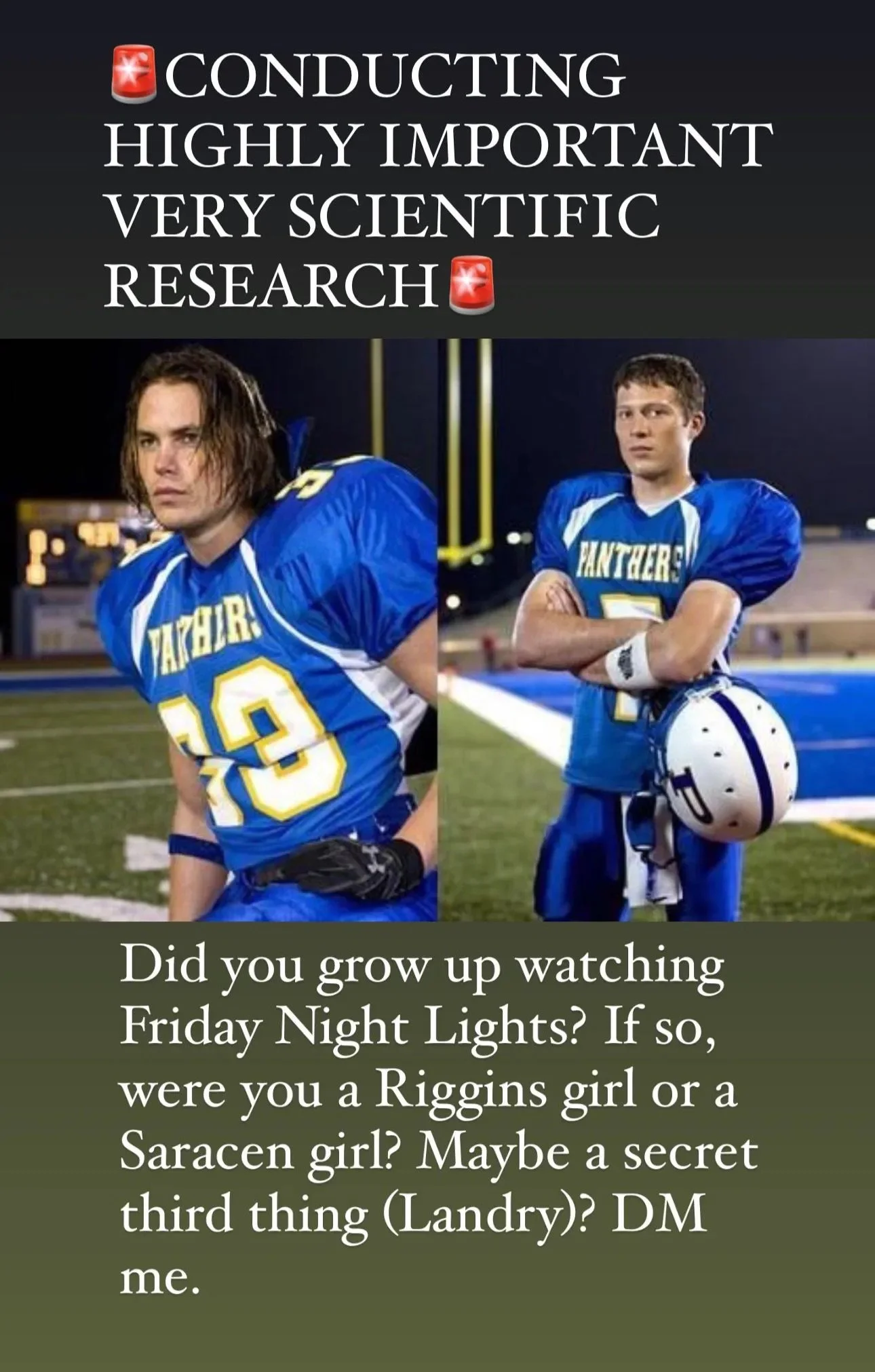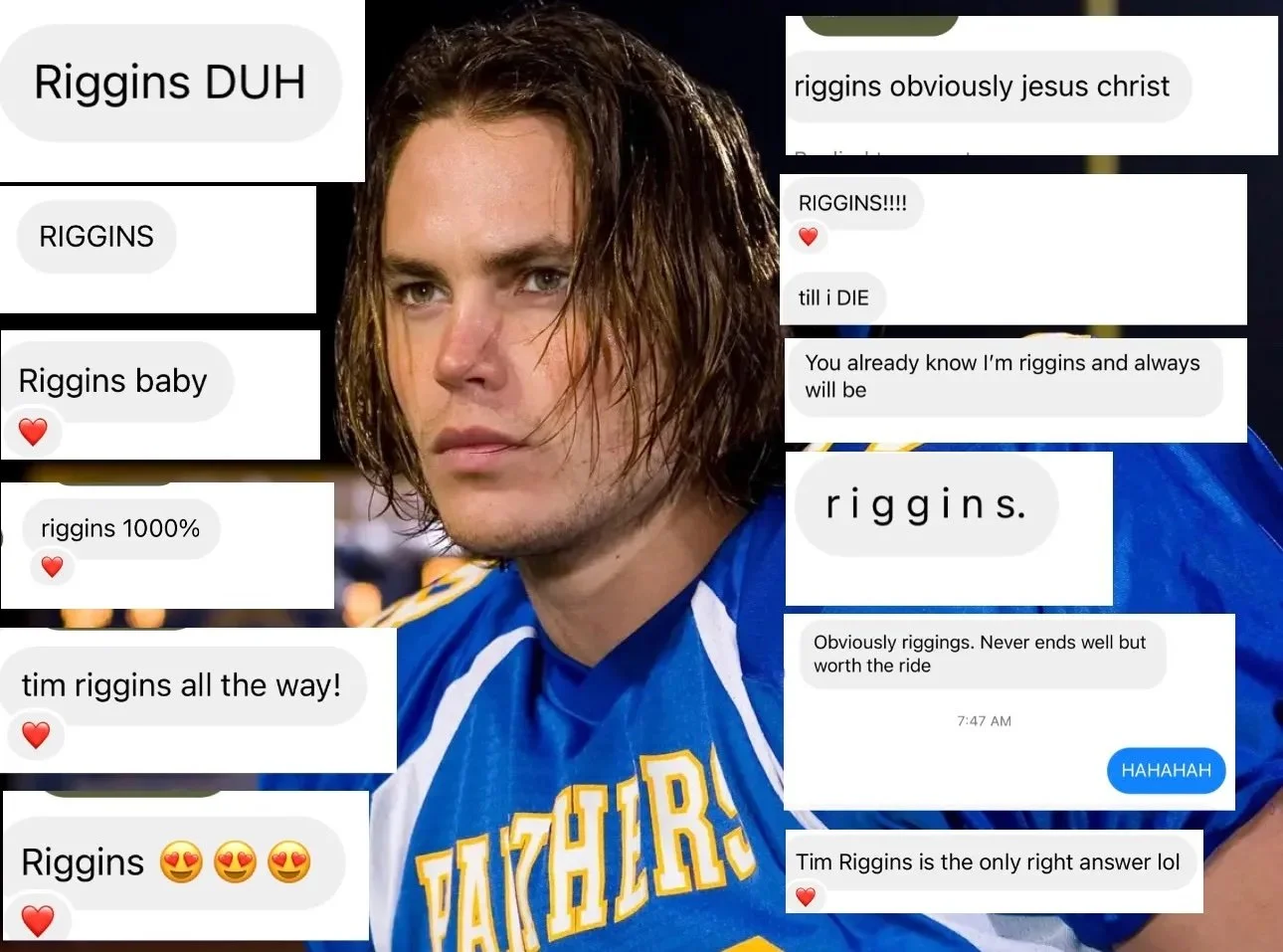The Tim Riggins Paradigm
I spoke to thirty-two women about their favorite teenage soap antiheroes, and what they can tell us about women's dating lives.
Note - This has been copied over from my Substack, so formatting may be wonky.
Please note that the names of all participants have been changed to maintain privacy. Any name resemblance to individuals who actually follow me on Instagram is coincidental, as I have carefully renamed each of them after a Love Island S10 cast member.
It is a normal impulse to try and sort humans into a binary. While I believe the evolution in recent years to see individuals as existing on various points on various spectrums is perhaps more accurate, there are still instances where categorizing people into rigid binaries is both necessary and correct. I don’t mean sexuality, gender, or anything like that. Oh no, I aim to discuss something far more important: Where one falls on the issue of Tim Riggins vs. Matt Saracen, teenage heartthrob character foils from the mid-2000s Texas high school football team melodrama, Friday Night Lights.
If you’ve never seen the show, fix that, quickly. I’ll give you a quick rundown: In the semi-fictional town of Dillon, Texas, the lives of our characters revolve almost entirely around the town’s ultra-competitive high school football team. Naturally, Matt Saracen and Tim Riggins are football players. Matt Saracen is a sweet, mild-mannered boy who single-handedly cares for his dementia-addled grandmother. He’s kind, responsible, and predictable, but lacking in confidence. Tim Riggins, on the other hand, is an unabashedly Texan teenage alcoholic. He’s undeniably gorgeous (thanks to Taylor Kitsch’s bone structure, which should be studied in a lab) and like Saracen, has a less-than-ideal home life. However, he demonstrates little personal responsibility and more questionable morals- drinking heavily, fighting often, and sleeping with his best friend’s girlfriend immediately after said best friend, Jason Street, becomes paralyzed on the football field. Even their positions on the team are allegorical- Riggins is a bullish, barreling, fullback/running back and Saracen is our reluctant quarterback, abruptly promoted from second-string to starter after the accident that brought a swift and tragic end to superstar Jason Street’s career.
I am a firm believer that you can learn a lot about someone by asking how they self-identify as a Riggins girl vs. a Saracen girl. No one is allowed to get mad at me for that- I am not the first person to suggest that an individual’s identification with, or pull toward one foil character on a teenage soap opera conveys more about them as a person than any zodiac sign or Meyers-Briggs test ever could. Buzzfeed built an entire empire on quizzes that tell you precisely what your thoughts on TV and movie characters say about you.
Additional obvious examples of this are Chuck Bass and Nate Archibald (Gossip Girl), Damon and Stefan Salvatore (Vampire Diaries), and Edward Cullen and Jacob Black (Twilight). All of these works rely upon the same basic premise of a sympathetic nice guy and a tortured bad boy. It’s a good storytelling device and an even better marketing one, with the knowledge that most young women in the audience will choose firm allegiance to one or the other. It’s the same reason why boy bands exist- if you can cram five boys with ultra-defined, archetypal personalities into a single act, you’re going to reach four times more young women than you would with a solo performer. There’s an inherent tension in being asked to choose that makes the fanfare more active and therefore, more compelling.
Interestingly, when I’ve casually polled my friends on which character “type” is their favorite, I’ve seen tremendously high rates of consistency. If you are a Nate girl, you are likely a Saracen girl, a Riggins girl if you prefer Chuck Bass, and so on and so forth. For the purpose of transparency, I am and always have been a Saracen girl, which comes as a shock to absolutely no one. My fiancé (just got engaged, please clap) is deeply Saracen-coded. He has also never seen the show, which means I get to come on here and share information about him with reckless abandon, and he is unable to confirm or deny! I’ll leave it at this- I once watched him wedge himself between subway doors as they were closing on a child inside a stroller and pull the stroller away to safety. I don’t know if any of you have ever watched your partner literally save a baby, but it’s very good for the relationship. That is textbook Saracen behavior! Tim Riggins would have been hammered, passed out on a stranger’s shoulder, and missed the entire ordeal.
I began to wonder if, like me, most women’s preferences for TV character tropes carried over into their actual dating lives and personal taste in romantic partners. I decided to expand my research pool beyond my college group chat and took to Instagram, hoping to receive a few responses.
It was a lot more than a few. People really wanted to talk about this. I received thirty-four DMs, from thirty-two women and two very brave men. Responses were not exactly mixed.
As you can see, Riggins won by a landslide, with only two votes for Saracen, one vote for Smash (a dark horse), one vote for Vince (a character in the later seasons portrayed by Michael B. Jordan, so I’m surprised I didn’t get this more) and a handful of votes for Coach Taylor (played by Kyle Chandler). Not one person said Landry, Saracen’s homely sidekick who murdered Tyra’s sexual assailant just because he had a crush on her! Jesse Plemmons, I will avenge you!
I then asked a rather personal follow-up question: Do you feel that your Saracen vs. Riggins preference is accurate to your real-life preferences in dating? Do you find yourself going for the "Riggins type" or the "Saracen type" IRL?
I am extremely grateful for everyone who engaged with me, and with surprising candor— Particularly women I don’t know well at all beyond being Instagram mutuals. There was a common throughline among the Riggins girls of extreme self-awareness and at times, self-consciousness surrounding their choice. Common themes were, “I know I should probably go for a Saracen, but-” or, “I’m drawn to the Riggins type, but it never works out,” and perhaps most commonly, “Saracens are the sweet ones, but Riggins is just hotter, I’m sorry.”
Ella, 23, said, “Saracen is what I need, but Riggins is what I always go for. For example, my ex-boyfriend with major daddy issues cheated on me, and we still hang out.”
Whitney, 27, echoed a similar sentiment. “As a die-hard Tim Riggins adorer (also a Chuck and Damon girl) I love to date the bad option. I consistently date guys who are depressed and slightly mean.”
Amber, 25, cited Riggins’ edge, intrigue, and charm as what drew her and so many others to him, while Saracen demonstrates more of a softness. “The saying ‘nice guys finish last’ comes to mind,” she said.
I had that exact phrase in mind myself when I set out to write this piece. “Nice guys finish last” and “girls love douchebags” have become popularly understood to be incel dog whistles, when lonely, frustrated men seek to cast blame on what they perceive to be inherent female inferiority in a sordid attempt at self-soothing.
Misappropriation for unfettered misogyny aside, I think every woman reading this would admit there’s at least some degree of truth in “girls love douchebags”. However, the phenomenon is misunderstood by grossly oversimplifying feminine attraction, ignoring the possibility that women, much like men, might pursue romantic partners for vapid reasons (i.e. Tim Riggins is sexy). And have every right to do so.
Furthermore, there’s often an accusation that women have an inherent proclivity for masochism. This reeks of unsolicited paternalism—we just don’t know better, and can’t manage to keep ourselves from harm’s way.
To bring things back to Love Island, (as any good piece of writing should) this is beautifully exemplified by this most recent season’s supervillain, Messy Mitch. Mitch, who on multiple occasions in an effort to manipulate the hearts and minds of the women on the show, says something to the effect of, “You know, Other Welsh Guy with the biceps isn’t good for you. I would treat you so much better than he would.” It was a hilariously whiney, misguided attempt at seduction. He was very quick to throw himself a “nice guy” pity party rather than reckon with the notion that he may just be deeply weird. Occam’s razor.
One woman I spoke to reflected on the jackass trope more broadly. Jess, 25, wondered if it was possible that the Riggins character, and ones like him, encouraged a kind of sickly indulgent, “I can fix him” dynamic that causes women to seek out similarly complicated men in the real world.
“I feel like the media has given a lot of emotionally unavailable men a huge pass. In a show, the audience sees them treating women poorly, but afterward, we see him upset and feeling guilty over it, and we end up sympathizing with him,” she said. “So in real life, I think we often apply that same sympathy to men who behave poorly when they don’t necessarily deserve it. We hope and pray they’re experiencing that same guilt and self-reflection we see in problematic male TV characters, but in reality, they usually just don’t.”
I think Jess is on to something here. The explanation for women’s gravitational pull towards relationships with complex characters is likely a combination of our having been socialized to cater to the men in our lives to an almost maternal extent, but there’s also an element that’s much more pedestrian. Unhealthy, fraught relationships with tortured male characters are over-represented to the extent that, like anything else, young people will seek to emulate them. Adolescents and young adults expect, or even hope, to find that same level of tumult in their own interpersonal worlds. Anything less may be boring, possibly prompting us to create conflict in the places where we cannot find it. In the age of constantly mining our private lives to generate content, the compulsion to insert ourselves into a more interesting story should come as no surprise.
The important thing I want to harken back to, though, is the self-awareness component. Nearly every woman I spoke to, all in their early to mid-twenties, who outed themselves as a Riggins girl carried a real “fuck it” approach. If there’s ever a time for main character syndrome, and to date a Riggins type purely for the chaos, it’s definitely your early to mid-twenties. I remain almost clinically a Saracen girl through and through, but I think I’ll allow it—Texas forever, baby.

